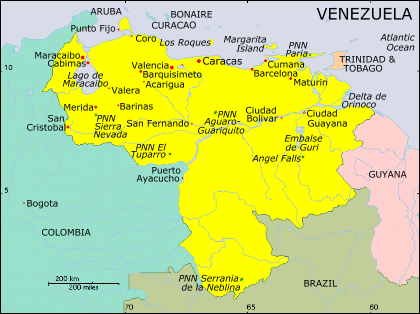
Washington, DC—(ENEWSPF)—October 24, 2017
The Department of State warns U.S. citizens to avoid travel to Venezuela due to concerns regarding violent crime, pervasive food and medicine shortages, and social unrest. Effective October 23, 2017, ordered departure of eligible family members of U.S. government personnel posted to the U.S. Embassy in Caracas and authorized departure of U.S. direct-hire government personnel was lifted, allowing U.S. government personnel and family members to return to Venezuela. This replaces the Travel Warning dated July 27, 2017.
All U.S. direct-hire personnel and their families assigned to the U.S. Embassy in Caracas are subject to an embassy movement policy that limits their travel within Caracas and many parts of the country. They are prohibited from traveling within 50 miles of the Venezuela/Colombia border without prior approval. Inter-city travel by car during hours of darkness (6:00 p.m. to 6:00 a.m.) is strongly discouraged and in some cases may be prohibited. Travel outside the Embassy’s residential area by Embassy personnel after 9:00 p.m. is limited and must follow strict security requirements. U.S. government personnel must also request approval for travel more than 50 miles away from Caracas and/or overnight stays outside of Caracas. These security measures may limit the U.S. Embassy’s ability to provide services.
The political and security situation in Venezuela is unpredictable and can change quickly. Protests and demonstrations occur with minimal public notice and, from April through August 2017, occurred daily and often turned violent. Security forces typically deployed a range of strong, and often excessive measures, including tear gas, pepper spray, water cannon, rubber bullets, birdshot, buckshot, and other live ammunition. Protests sometimes led to looting and vandalism. Armed, pro-government motorcycle gangs sometimes attacked and intimidated protesters. These clashes resulted in numerous serious injuries and deaths, including an estimated 160 killed between April and August. U.S. citizens have reported being arrested, detained, and robbed while in close proximity to protests.
Security forces have arrested individuals, including U.S. citizens, and detained them for long periods with little or no evidence of a crime. The U.S. Embassy may not be notified of the detention of a U.S. citizen and consular access to detainees may be denied or severely delayed. The detained citizen may be denied access to proper medical care, clean water, and food.
Violence and criminal activity – including homicide, armed robbery, kidnapping, and carjacking – pose significant and continuing security concerns. Indiscriminate violent crime is endemic throughout the country and can occur anywhere at any time. There are reports of authorities (e.g., police, airport, immigration) and criminals posing as authorities participating in robbery and extortion. Drug traffickers and illegal armed groups are active in the Colombian border states of Zulia, Tachira, and Apure.
The Simón Bolívar International Airport, in Maiquetía, is located in an extremely high-risk area for armed robbery and kidnappings. Do not take unregulated taxis from this airport and avoid ATMs in this area. Travel between the Simón Bolívar International Airport and Caracas only during daylight hours, as armed bandits frequently target night-time motorists along this route.
Due to shortages of medicine and medical supplies, U.S. citizens should be prepared to cover their own needs for over-the-counter and prescription medicines while in country. You should have medical evacuation plans in place that do not rely solely on U.S. government assistance. Comprehensive medical evacuation insurance is strongly advised for all travelers.
U.S. citizens may also be detained and/or deported by Venezuelan immigration officials for not complying with visa or immigration regulations. U.S. citizens traveling to Venezuela must have a valid visa that is appropriate for their specific type of travel (journalism, employment, study, etc.) or risk being detained or deported. Journalists must possess the appropriate accreditation and work visa from the Venezuelan authorities before arriving. International journalists are closely scrutinized and have been expelled and/or detained for lacking appropriate permissions to work in Venezuela or for participation in what could be seen as anti-government activity, including observing and reporting on public health facilities.
For further information:
- See the State Department’s travel websitefor the Worldwide Caution, Travel Warnings, Travel Alerts, and Country Specific Information for Venezuela.
- Enroll in the Smart Traveler Enrollment Program (STEP) to receive security messages and make it easier to locate you in an emergency.
- Contact the U.S. Embassy in Venezuela, located at Calle F con Calle Suapure, Lomas de Valle Arriba, Caracas at +[58] 212-975-6411, 8:00 a.m. to 5:00 p.m. Monday through Friday. The after-hours emergency number for U.S. citizens is +[58] 0212-907-8400 or, or 0212-907-8400 from within Venezuela.
- To reach the Department of State’s Overseas Citizen Services, call 1-888-407-4747 toll-free in the United States and Canada or 1-202-501-4444 from other countries from 8:00 a.m. to 8:00 p.m. Eastern Standard Time, Monday through Friday (except U.S. federal holidays).
Follow us on Twitter and Facebook.
Source: www.state.gov








